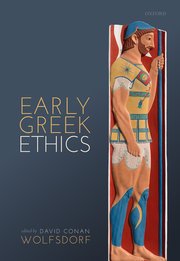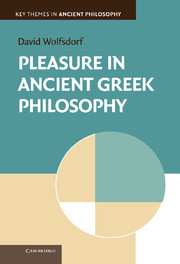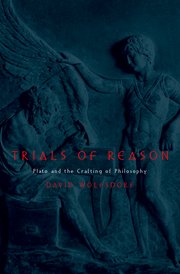OVERVIEW
I came into philosophy from classics and so into ancient philosophy. I brought with me a deep interest in language. I have also had an abiding concern with the nature of philosophy and with philosophical methodology.
I cut my teeth on Plato, first on the early dialogues, then working through the remainder of the corpus. My publications on Plato have ranged over various domains: epistemology, logic and argumentation more broadly, metaphysics, ethics, and philosophical psychology. I am relatively well versed in the ancient tradition from pre-Platonic figures through Plato, Aristotle, Epicurus, and the Old Stoics. My second book Pleasure in Ancient Greek Philosophy and more recent papers in ancient philosophy attest to this range. In 2020 I published a large edited volume focusing on pre-Platonic ethical philosophy.
Since the mid 2000s, I have increasingly extended my research into non-historical areas of philosophy. Following up on my philological background, I turned to the philosophy of language. Along with my interests in ethics and philosophical psychology, this work immediately led me into the metaethical debates between descriptivist and non-descriptivist interpretations of evaluative and normative language. In pursuing this subject, I was increasingly drawn to the resources of contemporary linguistics, initially formal semantics, then also syntax and pragmatics. The first fruit of this research was my third book On Goodness.
The focus of my research since about 2020 is value theory, both contemporary value theory and the history of value theory.
Descriptions of my books and edited volume follow in reverse chronological order.
VALUE, VALUING, VALUES
Value, Valuing, Values examines the three topics in the title, with each of the three main sections governed by a definitional question: What is value? What is it to value something? What are values? The organization of the book owes to my views that values constitute a subset of the entities that are valued and that valuing is a value-laden attitude toward its object. The first section of the work, on value, revisits and builds on chapter 4 of On Goodness, where I argue that value is a kind of purposiveness. In Value, Valuing, Values, I argue that, ontogenetically, the fundamental form of value is biological purposiveness.
ARETĒ AND THE FORMATION OF GREEK ETHICAL THEORY
From Plato onward, ancient Greek ethical theory is fundamentally framed in terms of two entities: virtue and eudaimonia. Virtue is a state of the psyche that an individual requires in order to live well; eudaimonia is the well-lived life that requires virtue. Aretē and the Formation of Greek Ethical Theory is an account of how this fundamental framework of ancient Greek ethical theory came to be.
The account has two parts. The first is principally linguistic. It focuses on the syntax, semantics, and pragmatics of ἀρετή, in particular in its occurrences from Homer to the end of the fifth century BCE. More precisely, the discussion addresses: ἀρετή as a mass noun and as a count noun, including conversion of ἀρετή from mass to count; the gradability of ἀρετή; the specifiability of ἀρετή; and what I refer to as the ontological categorical diversity associated with ἀρετή. To my knowledge, these topics have either not been treated before or they have been treated in a cursory way and without recourse to the relevant contemporary linguistic theories.
Insofar as it extends to the end of the fifth century, the linguistic discussion in the first part of the study overlaps with the period in which Greek ethical philosophy began. But the focus of the first part is on pre- and non-philosophical instances of ἀρετή. The intention is to build a theory and to apply the philosophical instances of ἀρετή to it. The latter is the task of the second part of the study. The temporal focus of this part extends from the earliest philosophical instances of ἀρετή at the beginning of the fifth century through the Socratics, principally Plato, and concludes with Aristotle.
The central thesis of the second part of the study is that prior to Plato, if not more broadly prior to the Socratics, in ethical philosophy ἀρετή is rarely used to denote virtue, that is, an ethical state of the psyche. It is in Plato, if not among the Socratics more broadly, that ἀρετή gets stativized and psychologized. The stative psychologization of ἀρετή in turn leaves a value-theoretic lacuna; and this lacuna is filled by εὐδαιμονία, which Plato (and perhaps the Socratics more broadly) appropriate to denote the activity of living well.
Insofar as it tells how the fundamental framework of ancient Greek ethical theory came to be, the account concerns a portion of the history of ancient Greek philosophy and so is historical-philosophical. But the account has a non-historical dimension, which concerns the foundations of value theory. In his so-called function argument in Republic 1, 352-54, Plato not only links ἀρετή and εὐδαιμονία in the fundamental way that frames all subsequent Greek ethical theory, he also treats εὐδαιμονία as the ἔργον (here, purpose or function) of ἀρετή. In doing so, Plato conceives of ἀρετή, as well as εὐδαιμονία, in teleological terms. I argue that this conception of ἀρετή and εὐδαιμονία is, loosely, but crucially accurate. It is so because, I argue, value is purposiveness. Aristotle is therefore well advised to appropriate Plato’s function argument in his own function arguments in Eudemian Ethics 2.1 and Nicomachean Ethics 1.7. Furthermore, in identifying the genus of ἀρετή as ἕξις, Aristotle further cements the stative conception of ἀρετή that Plato (or the Socratics) introduces.
EARLY GREEK ETHICS
Early Greek Ethics is a collection of essays, composed by 28 scholars of ancient philosophy and classicists, that I commissioned and edited.
In the last twenty years and especially very recently, a lot of disparate scholarship has been done on Greek ethical philosophical thought and writing from the fifth century BCE to about the first third of the fourth-century BCE, in particular ethical philosophical thought and writing not authored by Plato. The ancient contributors include other associates of Socrates such as Antisthenes, Aristippus, and Xenophon; figures from outside the Socratic circle such as Democritus, Gorgias, Antiphon, and Archytas; and anonymous texts such as the Dissoi Logoi and Anonymus Iamblichi.
Generally speaking, in assembling this work I sought to define the landscape of early Greek philosophical ethics and in doing that to advance it as a distinctive field of study.
Two of my chapters for the volume, “The Ethics of the Historical Socrates” and “On the Unity of the Dissoi Logoi” are available on the WORKS page.

ON GOODNESS
The governing question of my book On Goodness is: What is goodness? I pursue this question, which I regard as a metaphysical question at the foundations of value theory, by means of the semantic questions: What do the adjective “good” and the adjectival nominalization “goodness” mean? My central results are the following. The adjective “good” is fundamentally three ways ambiguous. Two of the three senses are gradable (for example, “good,” “better,” “best”); and both of the gradable senses are multidimensional (for example, there are not kinds of height, the dimension or gradable property associated with “tall”; but there are kinds of value, the dimension associated with one of the senses of “good”).
I reject explanations of dimensional specification in terms of covert variables or indexicals in the so-called logical form of “good.” Instead, I argue that in tokenings, the adjective is implicitly or explicitly supplemented with adverbial or nominal contents, and that such supplements specify the associated dimension by means of directly or indirectly introducing an adverbial modifier of “good.” This explains the peculiar inferential properties of “good” (and kindred terms) that have puzzled philosophers and linguists since Geach, if not Aristotle. It also shows, contrary to common opinion, that “good” is, in one important respect, not a context sensitive expression.
In contrast to “good,” the nominalization “goodness” is not three ways ambiguous. It derives from only one of the three senses of “good.” “Goodness” is a mass noun; its denotation is therefore representable as a join semilattice. But owing to the fact that the adjective from which it derives is gradable, the denotation has additional scalar structure. Finally, it is well known in linguistics that mass nouns, like plural count nouns, can occur bare, that is, in argument positions without determiners and that such phrases admit various readings. I suggest a neo-Carlsonian explanation of the various readings.
Finally, the central metaphysical implication of the linguistic results is that an instance of goodness is, in Kit Fine’s and Frederike Moltmann’s terms, a qua object of a kind, more precisely a qua quantitative trope, and more precisely still one degree of value (which I argue in an earlier chapter and also on linguistic grounds is purpose serving) of a kind taken in relation to another degree of value of that kind, where the latter is a contextually determined standard of comparison, and where the former significantly exceeds the latter.
The table of contents and Introduction to On Goodness is available on the WORKS page.

PLEASURE IN ANCIENT
GREEK PHILOSOPHY
Around the time that most of the research and writing of my first book Trials of Reason: Plato and the Crafting of Philosophy had been completed I turned my principal attention to the subject of pleasure. My motivations were primarily two. First, I wanted to shift focus from an author or figure or school to a topic or theme. Second, I found in the topic of pleasure a nexus of two growing interests: in ethics, especially metaethics, and in philosophy of mind or philosophical psychology.
In 2012 I completed Pleasure in Ancient Philosophy (CUP), which examines pleasure in ancient philosophy from pre-Platonic figures through Plato, Aristotle, Epicureans, Cyrenaics, and the Old Stoics. The study also includes some Roman and Late Antique authors who contribute to and discuss the work of these earlier schools and figures. The book examines two basic questions, which I call the identity and kinds questions: What is pleasure? And what kinds of pleasure are there? I hope to have made a strong case that the various ways these figures and schools answer these questions are dialogically continuous. For example, Aristotle’s formulations involve criticisms of Plato, and Epicurus develops Aristotelian contributions. In the penultimate chapter I discuss treatments of the identity and kinds questions in contemporary Anglophone philosophy, precisely from Ryle’s contributions in the late 40s and 50s to the present. In the final chapter I discuss the relations between the ancient and contemporary treatments. One fundamental, remarkable conclusion of this comparison is that ancient treatments tend to focus on what I call the objects of pleasure, whereas contemporary treatments focus on the attitude toward such objects. I explain this distinction in view of the distinct contexts in which ancient and contemporary treatments of the identity and kinds questions have occurred, namely, within ethics and philosophy of mind respectively.

TRIALS OF REASON:
PLATO AND THE CRAFTING OF PHILOSOPHY
The first stage of my professional career focused on Plato’s thought. In line with my historical background my principal interest was understanding Plato on his own terms. My articles on Plato up to about 2008 represent attempts to achieve the objective. They focus on a wide range of Plato’s thought: his ethics, methodology, epistemology, metaphysics, and psychology, as well as on the problem of interpreting any aspect of Plato’s thought given the distinctive challenge and complication of the dialogic form of his writings. Trials of Reason: Plato and the Crafting of Philosophy (OUP 2008) culminated this vein of research.
The book pursues two questions: What is Plato’s conception of philosophy? And how is the dialogue form employed in Plato’s presentation of this conception? In brief, I maintain that Plato conceives of philosophy as a kind of motivation, specifically a desire for wisdom, which he conceives as ethical knowledge. The book is then organized as a discussion of Plato’s conception of desire, ethical knowledge, the means of pursuing such knowledge, including the so-called elenctic and hypothetical methods, and the aporetic conclusions in which these pursuits typically end. In his early dialogues, Plato introduces philosophy (as he conceives it) and in doing so contrasts philosophy with what I call “counter-philosophical” approaches to life. This contrast serves to explain the dialogic character of Plato’s work. As I put it in the book: Plato’s dramatizations “are not wholly situated within the sphere of philosophical discourse. Rather, one of the basic functions of the texts is to craft philosophy. As the dialogues unfold, philosophical discourse emerges out of the various discourses of the polis. In the process, Plato works to establish why philosophical discourse must be the authoritative political discourse.” As such, I suggest, Plato’s dialogues are as much works of meta-philosophy as philosophy.
In short, my deepest concern in this early work might be expressed in this way: I was interested in the idea that philosophy is a cultural-historical kind, and I wanted to examine one of its earliest and most important forms. I wanted to understand philosophy by examining one of the seminal ways in which it came into being. My approach to the topic was therefore inextricably historical and philosophical.
